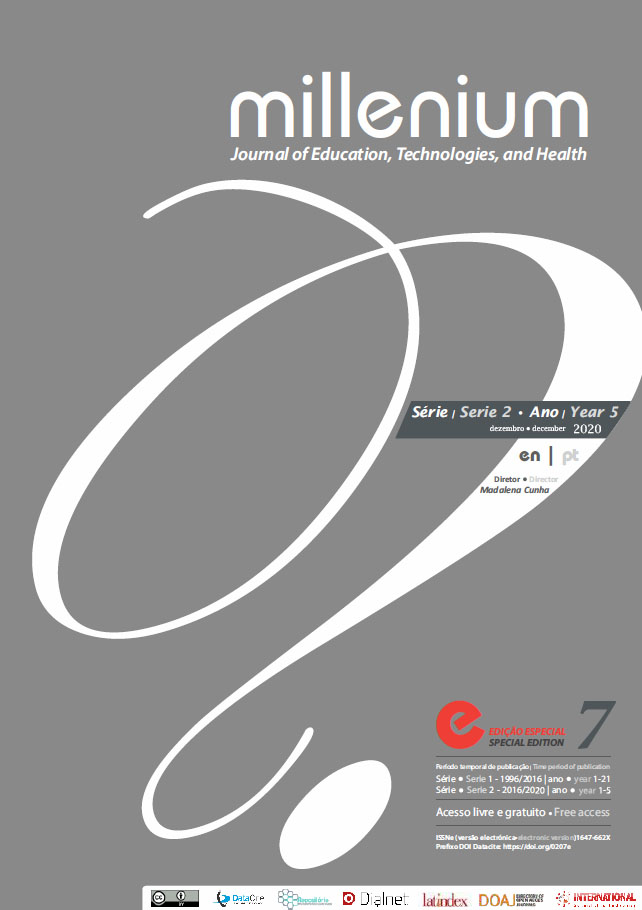Meanings attributed to the mentoring program implemented in a higher education institution
DOI:
https://doi.org/10.29352/mill0207e.11.00386Keywords:
inclusion, mentoring, meanings, roles played in mentoring, higher educationAbstract
Introduction: The present work is based on the interest in monitoring the processes developed and experienced under the Mentoring Program of a higher education institution, during the academic year 2019/2020. The implementation of the principles of inclusive education in higher education is a challenge to the institution itself, teachers and students, which can be realized in the implementation of Mentoring Programs.
Objectives: To understand the significance of the implementation of the Mentoring Program for students; Recognize which were the main roles played in mentoring.
Methods: This study starts from the entry into the field in the Mentoring Project existing of a higher education institution, through the methodological tools of the descriptive and exploratory study, of a qualitative nature. The sociopoetic methodology was used to approach the data collected in the study's database: “Inclusive practices at the institution: Perceptions about the Implementation of a Mentoring Program”.
Results: The results, obtained subjectively and empirically, allowed us to conclude that from "Meaning Attributed to the Implemented Mentoring Program" nine categories emerged, namely: "Meaning attributed to the moment when it started"; “Meaning attributed to the form of selection of the mentor-mentored pair”; "Meaning attributed to the guidelines received"; “Meaning attributed to the functions attributed to the tutor”; “Meaning attributed to the functions assigned to the mentor”; “Meaning attributed to the frequency and duration of the meetings”; "Meaning attributed to the established Mentoring relationship"; "Meaning attributed to the continuity of the Program in the institution" and "Meaning attributed to the value attributed to the Program".
Conclusion: This research work provided another approach to Mentorship in terms of form and style. However, there should be no doubt that Mentoring is always an instrument for the inclusion of all students, regardless of their individual characteristics, and the mentor must be supportive, a source of support, a support, not assuming protagonism, since the centre of the Mentoring Program are students and their full inclusion in the institutional and academic universe.
Downloads
References
Alquraini, T., & Gut, D. (2012). Critical components of successful inclusion of students with severe disabilities: Literature review. International Journal of Special Education, 27(1), 42-59.
Arantes, L.S., & Viegas, T.O.C. (2018). Mentoring para universitários: potencializando o desempenho profissional. Revista Atlante: Cuadernos de Educación y Desarrollo.https://www.eumed.net/rev/atlante/2018/10/mentoring-universitarios.html//hdl.handle.net/20.500.11763/atlante1810mentoring-universitarios
Arnesson, A., & Albinsson, G. (2017). Mentorship – a pedagogical method for integration of theory and practice in higher education. Nordic Journal of Studies in Educational POLICY; Vol. 3, 3, 202–217. https://doi.org/10.1080/20020317.2017.1379346
Clark, D.C. (2018). A Call for Multiculturalism in Higher Education. Acedido em https://diverseeducation.com/article/128883/
Correia, L. (2013). Inclusão e necessidades educativas especiais: Um guia para educadores e professores (2.ª Edição). Porto, Porto Editora.
Freire, T., & Beiramar, A. (2017). Tutorias por pares: acolher, promover e potenciar os estudantes do ensino superior. In: Almeida, L.S., & Castro, R.V. de (Orgs.). Ser Estudante no Ensino superior: As respostas institucionais à diversidade de públicos (pp. 13-22). Centro de Investigação em Educação (CIEd). Instituto de Educação, Universidade do Minho. Acedido em https://repositorium.sdum.uminho.pt/bitstream/1822/45129/1/2017-Ser-Estudante-no-Ensino-Superior.pdf
Girão, P.B.R. (2013). O mentoring no ensino superior. (Dissertação de Mestrado). Faculdade de Economia da Universidade de Coimbra. Acedido em https://core.ac.uk/download/pdf/19731776.pdf
Kahle-Piasecki, L, & Doles, S. (2015). A Comparison of Mentoring in Higher Education and Fortune 1000 Companies: Practices to Apply in a Global Context. Journal of Higher Education Theory and Practice; Vol. 15(5), 74-79.
Lunsford, L.G., Crisp, G., Dolan, E.L., & Wuetherick, B. (2017). Mentoring in Higher Education. BK-SAGE-CLUTTERBUCK-160405-Chp20.indd (pp. 316-334). Acedido em https://www.researchgate.net/publication/316492391_Mentoring_in_Higher_Education/link/5900ec670f7e9bcf65465ff3/download
Newman, I., & Conway, J. (2016) The nature of Iinclusive Llearning Eenvironments. The Journal of Inclusive Practice in Further & Higher Education, 7,100-111.
Phillips, A. (2019). The Quest for Diversity in Higher Education. Pepperdine Policy Review; Vol. 11, Article 4. Acedido em https://digitalcommons.pepperdine.edu/ppr/vol11/iss1/4
Santos, M. H., (2018). Sociopoética: Um método de pesquisa a favor da não-violência, dignidade e integralidade do ser humano no âmbito educacional. Revista Semana Pedagógica, 1, pp. 160-162.
Tinoco-Giraldo, H., Sánchez. E.M.T., & García-Peñalvo, F.J. (2020). E-Mentoring in Higher Education: A Structured Literature Review and Implications for Future Research. Sustainability; 12, 4344, 2-23; doi:10.3390/su12114344
Tomelin, K.N., Dias, A.P.I., Sanchez, C.N.M., Peres, J., & Carvalho, S. (2018). Educação inclusiva no ensino superior: desafios e experiências de um núcleo de apoio discente e docente. Rev. Psicopedagogia; 35(106): 94-103. Acedido em http://pepsic.bvsalud.org/pdf/psicoped/v35n106/11.pdf
UNESCO (1994). Declaração de Salamanca e enquadramento da acção na área das necessidades educativas especiais. Lisboa: IIE.
Ximenes, C.A. (2014). O mentoring como ferramenta de apoio à gestão de recursos humanos: um estudo de caso. Tese de Doutoramento. Instituto Politécnico de Setúbal. Escola Superior de Ciências Empresariais. Acedido em https://comum.rcaap.pt/bitstream/10400.26/7879/1/Tese%20-%20Carlos%20Ximenes%20-%20Mentoring_18%20DEZ%202014.pdf
Downloads
Published
How to Cite
Issue
Section
License
Authors who submit proposals for this journal agree to the following terms:
a) Articles are published under the Licença Creative Commons (CC BY 4.0), in full open-access, without any cost or fees of any kind to the author or the reader;
b) The authors retain copyright and grant the journal right of first publication, allowing the free sharing of work, provided it is correctly attributed the authorship and initial publication in this journal;
c) The authors are permitted to take on additional contracts separately for non-exclusive distribution of the version of the work published in this journal (eg, post it to an institutional repository or as a book), with an acknowledgment of its initial publication in this journal;
d) Authors are permitted and encouraged to publish and distribute their work online (eg, in institutional repositories or on their website) as it can lead to productive exchanges, as well as increase the impact and citation of published work
Documents required for submission
Article template (Editable format)





